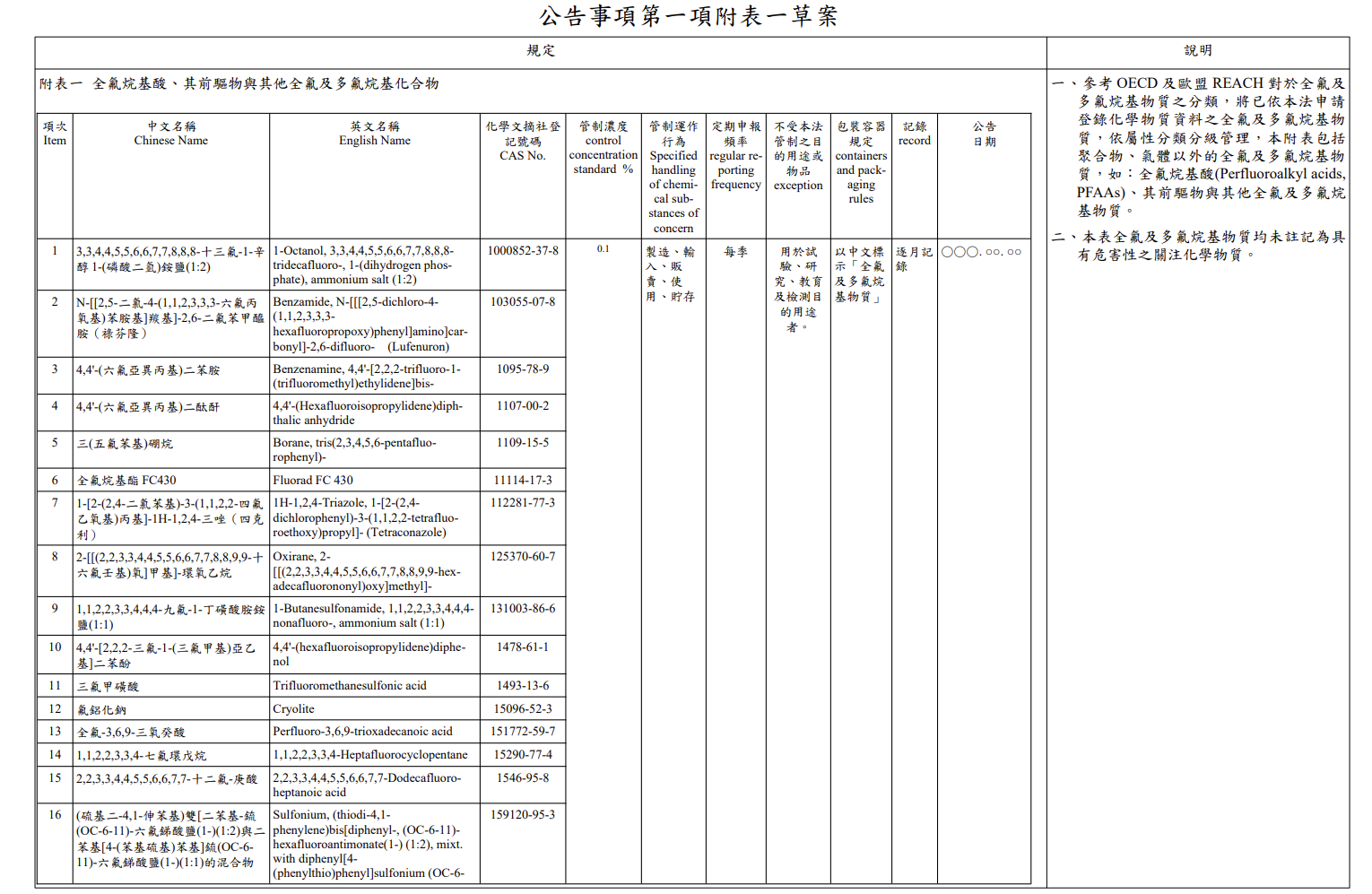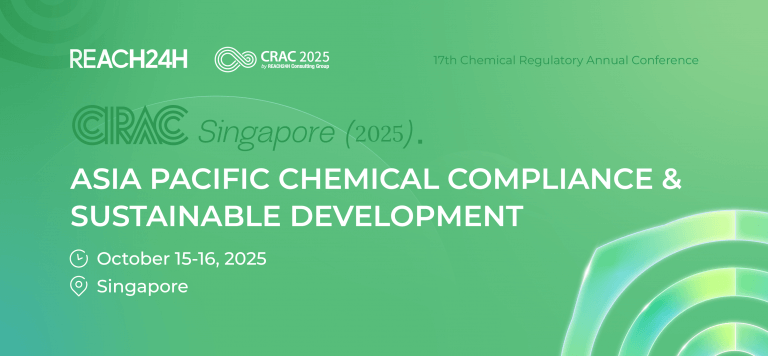Introduction
The Environmental Protection Authority of the Taiwan Region has recently announced a proposal to list 269 Per- and Polyfluoroalkyl Substances (PFAS) as Substances of Concern. This initiative aims to enhance environmental protection and public health while aligning with global regulatory trends. The proposal includes specifying regulatory concentrations and detailed management measures for these substances.

In addition, the Environmental Protection Authority has reviewed current PFAS-related operations in the Taiwan Region. Based on the operational risks and forms of these substances, a draft regulation titled " Regulation Governing the Designation and Operational Management of Per- and Polyfluoroalkyl Substances (PFAS)" has been developed. This regulation follows a tiered management approach to ensure proper oversight of PFAS.
Key Proposal: Add 269 PFAS to the List of Concerned Chemical Substances, along with Corresponding Concentration Limits and Management Measures
The draft regulation proposes categorizing the 269 PFAS into three groups based on their operational risks:
1. Perfluoroalkyl acids, their precursors, and other perfluoro- and polyfluoroalkyl compounds
2. Per- and Polyfluoroalkyl Substance Polymers (hereinafter referred to as PFAS Polymers)
3. Per- and Polyfluoroalkyl Substance Gases (hereinafter referred to as PFAS Gases)
Of these, 126 chemical substances fall under perfluoroalkyl acids, their precursors, and other perfluoro- and polyfluoroalkyl substances, 113 under PFAS polymers, and 30 under PFAS gases.
The regulatory concentration for all three categories is set at 0.1%, and specific operational activities, reporting requirements, exemptions, labeling, and recordkeeping measures are outlined for each category.
Table 1: Summary of Control Concentrations and Operational Requirements for PFAS Substances
Category | Regulatory Concentration (%) | Regulated Activities | Reporting Frequency | Exempted Uses | Labeling Requirements | Recordkeeping |
Perfluoroalkyl acids, their precursors, and other perfluoro- and polyfluoroalkyl compounds | 0.1 | Manufacturing, Importing, Selling, Using, Storing | Quarterly | testing, research, educational, and analytical purposes | Label as "Per- and Polyfluoroalkyl Substances" in Chinese | Maintain monthly records |
PFAS Polymers | 0.1 Note1,2 | Manufacturing, Importing | Quarterly | testing, research, educational, and analytical purposes | Label as "Fluoropolymers" or "Perfluoropolyethers" in Chinese | Maintain monthly records |
PFAS Gases | 0.1 Note1,3 | Manufacturing, Importing | Quarterly | testing, research, educational, and analytical purposes | Label as "Fluorinated Gases" or "Hydrofluoroolefins" in Chinese | Maintain monthly records |
Note:
1. The manufacture of PFAS polymers and PFAS gases refers to activities such as formulation, processing, and synthesis.
2. For PFAS polymers at concentrations of ≥0.1% but<30%, the container or outer packaging shall be clearly labeled with “fluoropolymer” or “perfluoropolyether.” Other operations are not subject to the control of this regulation.
3. For PFAS gases at concentrations of ≥0.1% but<30%, the container or outer packaging shall be clearly labeled with “fluorinated gas” or “hydrofluoroolefin.” Other operations are not subject to the control of this regulation.
In other words: The manufacture, import, sale, use, or storage of perfluoroalkyl acids, their precursors, and other perfluoro- and polyfluoroalkyl substances at concentrations of ≥0.1% shall require obtaining approval documents, keeping monthly records, submitting quarterly reports, labeling containers and packaging, and providing Safety Data Sheets (SDS).
The operation of PFAS polymers or PFAS gases at concentrations of ≥0.1% but<30% only requires labeling of containers and packaging; no approval documents, monthly records, periodic reporting, or SDS provision are required. However, the manufacture or import of PFAS polymers or PFAS gases at concentrations of ≥30% shall require obtaining approval documents, keeping monthly records, submitting quarterly reports, labeling containers and packaging, and providing SDS. Specific details are provided in Table 2.
Table 2: Overview of Management Measures for PFAS Substances
Category | Concentration (%) | Operational Activities | Management Requirements |
perfluoroalkyl acids, their precursors, and other perfluoro- and polyfluoroalkyl substances | ≥0.1 | Manufacturing, Importing, Selling, Using, Storing | Approval documents, monthly records, quarterly reporting, container labeling, SDS |
PFAS Polymers and PFAS Gases | ≥0.1 -<30 | Manufacturing, Importing, Selling, Using, Storing | Container labeling only |
PFAS Polymers and PFAS Gases | ≥30 | Manufacturing, Importing | Approval documents, monthly records, quarterly reporting, container labeling, SDS |
Two-Year Grace Period for Compliance
The environmental authority of Taiwan, China, emphasizes that the 269 PFAS substances newly listed as Concerned Chemical Substances are not subject to this regulation when used for testing, research, educational, and analytical purposes.
At the same time, considering the potential impact of this listing on relevant industries, the environmental authority of Taiwan, China, will provide a two-year grace period to allow companies sufficient time for adjustment.
Companies that are already operating with the listed PFAS substances shall complete the relevant requirements within the prescribed timeframe. Specific deadlines are provided in Table 3.
Table 3: Timeline for Completion of Required Actions for Already-Handled Listed Per- and Polyfluoroalkyl Substances (PFAS)
Required Actions | Deadline |
Label containers, packaging, and facilities; prepare SDS | Complete the necessary improvements before January 1, 2027. |
Obtain approval documents for specified activities | Obtain [the required document/license/registration] before January 1, 2027 |
Begin operational recordkeeping and periodic reporting | Begin recording from January 1, 2026, and submit periodic reports in accordance with regulations |
other regulatory actions not listed | Handle in accordance with the relevant regulations from the effective date of the announcement. |
Industry Collaboration and Public Participation
The environmental authority of Taiwan, China, notes that the addition of 269 substances will have a wide-ranging impact. It will continue to communicate with relevant departments and the industry to monitor subsequent developments and coordinate with other entities to jointly manage PFAS.
The draft has been opened for a 30-day public comment period, during which the public may submit opinions or proposed amendments within 30 days from the date of announcement for consideration by the environmental authority of Taiwan, China.
Recommendations from REACH24H Consulting Group
REACH24H Consulting Group recommends that relevant companies promptly review whether their products and raw materials involve any of the listed PFAS. For companies already handling the 269 PFAS substances newly listed, the environmental authority of Taiwan will provide a two-year implementation grace period to accommodate the regulatory changes.
At the same time, REACH24H Consulting Group reminds relevant companies to stay informed of and understand regulatory changes and updates to ensure operations remain within compliance.
For more information or service inquiries, please feel free to contact us at customer@reach24h.com!





